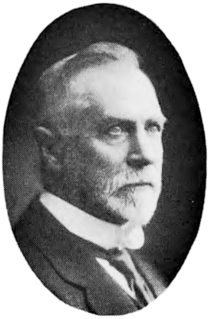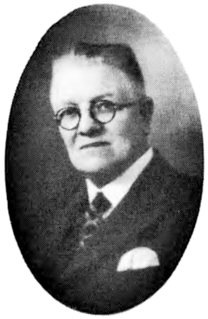Related Research Articles
This is a list of members of the Western Australian Legislative Assembly between the 1943 election and the 1947 election, together known as the 18th Parliament. In January 1945, the Nationalists, officially known as the National Party of Western Australia, reformed as the Liberal Party under the leadership of Robert McDonald, and all Nationalist MLAs' allegiances changed accordingly.

Elections were held in the state of Western Australia on 8 April 1933 to elect all 50 members to the Legislative Assembly. The one-term Nationalist-Country coalition government, led by Premier Sir James Mitchell, was defeated by the Labor Party, led by Opposition Leader Philip Collier.
This is a list of electoral district results of the 1947 Western Australian election.

Thomas Hamlet Harrison was an Australian politician who was a Country Party member of the Legislative Assembly of Western Australia from 1914 to 1924. He was the leader of the Country Party from 1919 to 1922.
Frank Tyndall Broun was an Australian politician who was a member of the Legislative Assembly of Western Australia from 1911 to 1914 and again from 1917 to 1924. He was a minister in the first government of Sir James Mitchell.

Richard Stanley Sampson was an Australian politician who was a member of the Legislative Assembly of Western Australia from 1921 until his death, representing the seat of Swan. He was a minister in the first government of Sir James Mitchell.
Lindsay Thorn was an Australian politician who was a Country Party member of the Legislative Assembly of Western Australia from 1930 to 1959, representing the seat of Toodyay. He was a minister in the government of Sir Ross McLarty.
The 1991 Floreat state by-election was a by-election for the seat of Floreat in the Legislative Assembly of Western Australia held on 20 July 1991. It was triggered by the resignation of Andrew Mensaros on 16 May 1991, due to ill health. He died before the by-election was held. The election was won by an independent candidate, Liz Constable, who finished with 58.94 percent of the two-candidate-preferred vote. Constable became the first woman to win election to the Parliament of Western Australia as an independent, and only the third woman overall to win a by-election.
The 1990 Cottesloe state by-election was a by-election for the seat of Cottesloe in the Legislative Assembly of Western Australia held on 11 August 1990. It was triggered by the resignation of Bill Hassell on 28 June 1990. The Liberal Party retained Cottesloe at the election with an increased majority, with Colin Barnett securing 70.26 percent of the two-party-preferred vote. The Labor Party did not field a candidate.
A by-election for the seat of Victoria Park in the Legislative Assembly of Western Australia was held on 10 February 1945. It was triggered by the death of the sitting member, Howard Raphael of the Labor Party, on 9 December 1944. The election was won by an independent candidate, William Read, who finished with 56.7 percent of the two-candidate-preferred vote. Outside of Read's victory, the election was also notable as the first in Western Australia to be contested by the newly established Liberal Party.
A by-election for the seat of Subiaco in the Legislative Assembly of Western Australia was held on 10 November 1917. It was triggered by the death of the sitting member, Bartholomew Stubbs of the Labor Party, on 26 September 1917. The election was won by Samuel Brown, a member of the Subiaco Municipal Council who was standing for the Nationalist Party. Brown was one of six candidates endorsed by the Nationalists, and won the seat despite only polling 15.02 percent of the first-preference vote.
Raymond Cecil Owen was an Australian agricultural scientist and politician. He was a member of the Legislative Assembly of Western Australia from 1944 to 1947 and again from 1950 to 1962. Owen was initially elected as an independent, but joined the Country Party in 1949.
A by-election for the seat of Morley-Swan in the Legislative Assembly of Western Australia was held on 9 May 1987. It was triggered by the resignation of Arthur Tonkin on 18 March 1987. The election was won by Labor's Frank Donovan, with the party suffering a small swing against it from the 1986 state election.
A by-election for the seat of Guildford-Midland in the Legislative Assembly of Western Australia was held on 13 March 1948. It was triggered by the death of the sitting member, William Johnson of the Labor Party, on 26 January 1948. The Labor Party retained the seat, with John Brady recording 53.7 percent of the two-party-preferred vote. The election was notable for the performance of the Communist Party candidate, Alexander Jolly, who polled 19.3 percent on first preferences.
The 1994 Helena state by-election was a by-election for the seat of Helena in the Legislative Assembly of Western Australia held on 10 September 1994. It was triggered by the resignation of Gordon Hill on 4 August 1994. The election was won by the Liberal Party, with their candidate, Rhonda Parker, recording 52.1 percent of the two-party-preferred vote. Parker became the first woman from the Liberal Party to win a by-election in Western Australia, and the fifth overall. Richard Court's government became the first sitting government to increase its majority at a by-election since 1943, when John Willcock's Labor government won East Perth from an independent.
A by-election for the seat of Ascot in the Legislative Assembly of Western Australia was held on 13 November 1971. It was triggered by the death of Merv Toms, the serving Labor member and Speaker of the Legislative Assembly, on 8 October 1971.
A by-election for the seat of Nedlands in the Legislative Assembly of Western Australia was held on 9 June 2001. It was triggered by the resignation of Richard Court, the sitting Liberal member and a former premier, on 27 April 2001. The Liberal candidate at the by-election, Sue Walker, retained the seat with 53.4 percent of the two-candidate-preferred (2CP) vote, a negative swing of 1.5 points from the 2001 state election. The Greens made the final 2CP count for only the second time in their history.
A by-election for the seat of Dale in the Legislative Assembly of Western Australia was held on 7 May 1988. It was triggered by the resignation of Cyril Rushton on 25 February 1988. The seat was retained by the Liberal Party, with their candidate, Fred Tubby, winning 59.1 percent of the two-candidate-preferred (2CP) vote. The Labor Party did not stand at the election, despite having lost the seat by less than 400 votes at the 1986 state election. A former Labor candidate, Michael Marsh, won 40.9 percent of the 2CP vote standing as an independent.
A by-election for the seat of York in the Legislative Assembly of Western Australia was held on 21 November 1942. It was triggered by the resignation of Charles Latham on 7 October 1942, to take up an appointment to the Senate. The Country Party retained the seat, with Charles Perkins winning by just 40 votes on the two-candidate-preferred count.
References
- ↑ Richard Stanley Sampson Archived 10 July 2018 at the Wayback Machine , Biographical Register of Members of the Parliament of Western Australia. Retrieved 15 January 2017.
- ↑ Black, David; Prescott, Valerie (1997). Election statistics, Legislative Assembly of Western Australia, 1890-1996. Perth, Western Australia: Parliamentary History Project and Western Australian Electoral Commission. p. 333. ISBN 0-7309-8409-5.
- ↑ Raymond Cecil Owen – Biographical Register of Members of the Parliament of Western Australia. Retrieved 17 January 2017.